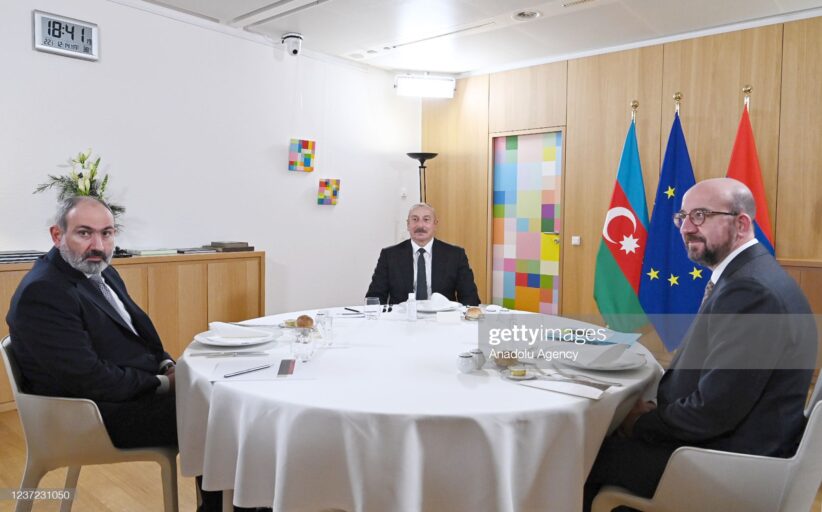By Emilio Luciano Cricchio
During a trilateral meeting on December 14 in Brussels, the leaders of Armenia and Azerbaijan reached a consensus regarding the reopening of railway networks between the two countries. One point of contention remains Azerbaijani President Ilham Aliyev’s demand that the access route through Armenia’s south to its exclave of Nakhichevan be customs free. Aliyev says if this demand is rejected, then Armenians must pass through Azerbaijani customs to reach Nagorno-Karabakh.
Prior to the meeting, which was organized by the President of the European Council Charles Michel, Pashinyan wrote on his Facebook page that Azerbaijan is attempting to bring the issue of opening regional transport communications to a deadlock.
According to Pashinyan, Aliyev has been attempting to draw parallels between the issue of opening up regional transport communications with the Lachin corridor – the only access route from Armenia to Karabakh. Pashinyan wrote that this contradicts the current signed agreements between the two countries and is unacceptable for the Armenian side.
Before the Pashinyan-Aliyev-Michel meeting, Azerbaijani President Ilham Aliyev held a joint press conference with Jens Stoltenberg, the Secretary General of NATO, in which he stated that Azerbaijan should have access between its exclave of Nakhichevan and Azerbaijani-controlled parts of Karabakh through the southern Armenian Syunik region, in the same way Armenia has access to Nagorno-Karabakh through the Lachin corridor.
In the end-of-war agreement of November 9, 2020, Armenia agreed to hand over the Lachin region to Azerbaijan by December 1, 2020. But, the agreement also provided that the Lachin corridor would not be handed over and a 5 kilometre strip of land would instead be manned by Russian peacekeepers, ensuring access between Armenia proper and Nagorno-Karabakh.
Aliyev’s statement caused angst in Yerevan, as both Yerevan and Moscow officials, including Russian Deputy Prime Minister Alexei Overchuk, have separated the issue of opening up regional communications from the Lachin corridor and have stated that any new access route will fall under the sovereignty of the country they pass through.
Aliyev furthermore stated that the “Zangezur corridor”, as he refers to the transport link in Armenia’s south, is enshrined in the November 9, 2020 trilateral statement between the leaders of Armenia, Azerbaijan and Russia, calling it an obligation for Armenia.
In recent months, Aliyev has made a number of threatening statements regarding the issue of future access routes. In a televised interview on Azerbaijani state TV, Aliyev demanded that Armenia set a date for the opening of the “Zangezur corridor”.
“If Armenia wants to, we will solve this issue easily, if it does not, we will solve it by force,” Aliyev said.
In the Brussels meeting, there was, however, consensus on some other issues. Both sides reaffirmed their commitment to the reopening of Soviet railway networks. Accordingly, the future railway networks will operate in accordance with internationally accepted customs and border rules, on a reciprocal basis, under the sovereignty and jurisdiction of the two countries. Armenia will in addition gain access by rail to Iran and Russia.
The two leaders moreover agreed to continue contacts.
Reference was made to humanitarian issues. Pashinyan emphasized the need for an immediate solution to the outstanding humanitarian issues, including the returns of Armenian captives being held in Azerbaijan.
The three leaders also discussed how to take concrete steps to reduce tensions in the region and reference was made to the border demarcation and delimitation process between Armenia and Azerbaijan.
After the summit, Charles Michel, the President of the European Council, released a statement, stating that the European Union will provide an advisory group to assist and provide technical assistance to both countries with regards to the border delimitation and demarcation process.
President Michel praised the steps taken by the two leaders to reduce tensions, including the establishment of direct contacts between the defense ministers of the two countries, adding that this mechanism will help prevent future incidents.
In terms of humanitarian issues, President Michel called for release of all remaining captives, and welcomed the release of ten Armenian POWs on December 4, 2021.
















